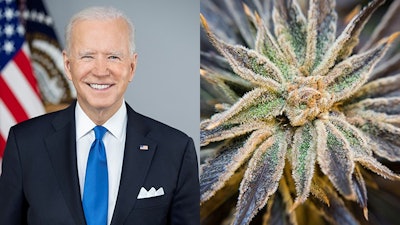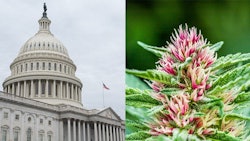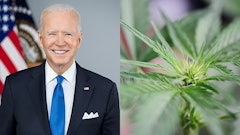
Before elected president, Joe Biden reaffirmed his position that “No one should be in jail because of cannabis use,” during his campaign trail in 2020.
Nearly a year and a half after he took office, those seeking justice for cannabis-related convictions as a $24-billion state-legal industry unfolded in 2021 began to wonder if his comments were just for show—Biden did not use his clemency powers once.
But the president turned a page on April 26, announcing that he is granting clemency to 78 individuals. Biden will pardon three people “who have demonstrated their commitment to rehabilitation” and are striving to be contributing members of society. Also, he is commuting the sentences of 75 people who are serving long sentences for non-violent drug offenses.
Many of the 75 people Biden plans to pardon would have received lower sentences if they were charged with the same offenses today, he said in a White House statement.
“America is a nation of laws and second chances, redemption, and rehabilitation,” Biden said in the statement. “Elected officials on both sides of the aisle, faith leaders, civil rights advocates, and law enforcement leaders agree that our criminal justice system can and should reflect these core values that enable safer and stronger communities. During Second Chance Month, I am using my authority under the Constitution to uphold those values by pardoning and commuting the sentences of fellow Americans.”
Among the three people Biden is pardoning is Dexter Eugene Jackson, a 52-year-old of Athens, Ga., who was convicted in 2002 for using his business to facilitate the distribution of cannabis. Jackson was not personally involved in trafficking but allowed distributors to use his pool hall to enable cannabis transactions. He pled guilty to the charge and accepted full responsibility, according to the White House’s clemency recipient list.
Many of the 75 commutations included those incarcerated for possession or distribution of cocaine, some of whom received sentences based on the bipartisan Anti-Drug Abuse Act of 1986, which then U.S.-Sen. Joe Biden co-crafted and co-sponsored. The legislation authorized new funding for drug treatment programs and stricter penalties for drug offenses. It cleared both chambers of Congress with overwhelming majorities.
After Ronald Reagan signed it into law, an overlooked provision came to light, which infamously became known as the 100-to-1 disparity. The law required the same five-year-minimum prison term for crimes involving 5 grams of crack cocaine as for those involving 500 grams of powder cocaine.
But at least eight of the 75 commutations Biden announced Tuesday dealt with cannabis-related offenses.
Jose Luis Colunga, of Juniata, Neb., was charged with the conspiracy to distribute and possession with intent to distribute 1,000 kilograms or more of cannabis in Tennessee. Colunga was sentenced to 20 years of imprisonment with a 10-year term of supervised release in July 2010.
Stacie Demers, of Constable, N.Y., was charged with the conspiracy to possess with intent to distribute cannabis, aiding and abetting the possession with intent to distribute cannabis in New York. Demers was sentenced to 10 years of imprisonment with a five-year term of supervised release in 2016.
Carry Le, of Duluth, Ga., was charged with conspiracy to possess with intent to distribute 1,000 or more cannabis plants in Texas. Le was sentenced to 10 years of imprisonment with a five-year term of supervised release in 2016.
Those are just a few of many.
The 75 individuals “are serving long sentences for non-violent drug offenses, many of whom have been serving on home confinement during the COVID-pandemic—and many of whom would have received a lower sentence if they were charged with the same offense today, thanks to the bipartisan First Step Act,” Biden said.
The First Step Act of 2018 provides eligible inmates the opportunity to earn 10 to 15 days of time credits for every 30 days of successful participation in evidence-based recidivism reductions programs and productive activities, according to the Justice Department. In large part, the act was an effort by lawmakers to reduce the size of the federal prison population.
Weldon Angelos, once an aspiring musician who has dedicated his life to ending cannabis prohibition and mass incarceration through The Weldon Project, told Cannabis Business Times last year that the First Step Act does not do enough.
A presidential pardon recipient, Angelos sold $300 worth of cannabis to a confidential informant on three occasions, a low-level crime that prosecutors used to charge him with 20 different federal crimes. In 2004, when he was just 25 years old, Angelos was convicted of 16 of the 20 counts and was sentenced to 55 years in prison without the possibility of early release.
Angelos served 13 years of the mandatory 55-year prison sentence before he was released.
“The First Step Act, you know, we call it that because it was just the first step act,” he told CBT. “It was just the first step, and we definitely need the second step, we need the third step. We need to keep pushing. And the momentum for criminal justice reform had sort of died down after that. And so, we really need to keep pushing. The First Step Act allowed judges to relook at these sentences to revisit them. … But we need to keep going because there’s a lot of other provisions that need to be reformed.”
In addition to granting 78 people clemency, Biden also announced that his administration is taking new steps toward supporting those reentering society after incarceration.
Those actions include a new collaboration between the Justice and Labor departments to provide job training; new grants for workforce development programs; greater opportunities to serve in federal government; expanding access to capital for people with convictions trying to start a small business; improved reentry services for veterans; and more support for health care, housing and educational opportunities.
“While today’s announcement marks important progress, my administration will continue to review clemency petitions and deliver reforms that advance equity and justice, provide second chances, and enhance the wellbeing and safety of all Americans,” Biden said.

























